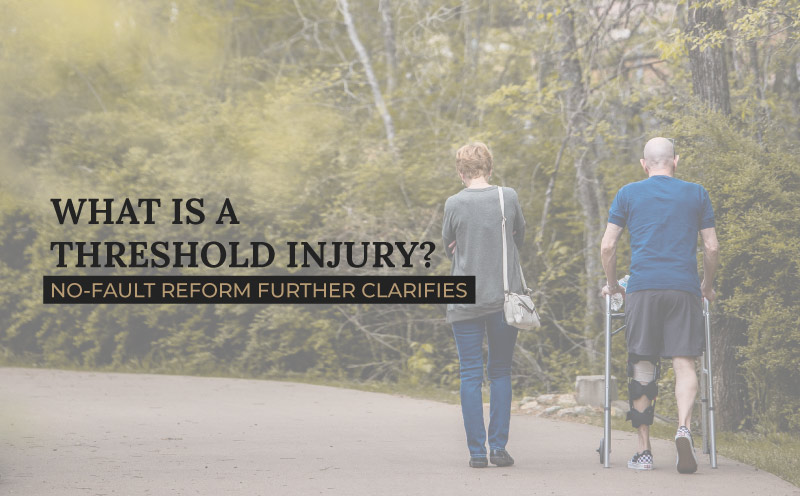What is a Threshold Injury? No-Fault Reform Provides Further Clarification

Authored by Grand Rapids auto accident lawyer, Tom Sinas
What is a threshold injury? If you’ve been injured in a motor vehicle collision, have heard this term tossed around, and are confused and wonder what it means, we have good and bad news. The bad news is, you’re not alone. Threshold law has been the source of great debate in Michigan amongst practitioners and judges throughout the years. It seems that as soon as the courts settle on what constitutes a “serious impairment of body function,” an appellate decision upends that definition. The good news, though, is that we seem to be heading toward some stability in this area of law, and the 2019 no-fault reforms provide further clarification. If you’re wondering what a threshold injury is and if it applies to your situation, read on.
Michigan’s Threshold Injury Requirement in Auto Negligence Cases
The term “threshold injury” is unique to Michigan car accident claims. In many other states, if another driver causes a collision and you’re hurt, you can pursue a claim against them. The extent of your injuries will determine what types of damages you may recover. It is not that straightforward in Michigan. Since Michigan is an auto no-fault state, your injuries must satisfy the “threshold injury” requirement in order to pursue a claim against the at-fault driver of your accident. This claim, also referred to as an auto negligence claim or an auto liability claim, compensates injured parties for quality of life damages, also known as non-economic damages, such as pain and suffering, loss of function, loss of independence, embarrassment, etc.
What is a Threshold Injury?
In legal terms, a threshold injury is defined as a “serious impairment of body function,” “permanent serious disfigurement,” or death. In short, threshold law is a test that an injured person must pass in order to show that their injuries are “serious enough” to pursue damages against the driver responsible for their collision. For example, someone sustaining a life-altering injury requiring intensive care, treatment, or rehabilitation will likely meet the threshold requirement. Threshold law only applies to auto accidents and is the measure used to determine a person’s ability to sue the driver who caused the accident for their injuries.
While “permanent serious disfigurement” seems rather straightforward, you’re probably wondering what constitutes a “serious impairment of body function.” This definition is more subjective and has been the core issue in many cases our firm handles, requiring interpretation by the courts.
For example, in 2019, the Court of Appeals decided the published case of Piccione v. Gillette, 327 Mich. App. 16. The case involved a clavicle fracture in a three-year-old causing a variety of lifestyle changes for four months following the accidents. The trial court originally ruled that the child’s injuries did not meet the threshold injury requirement. However, on appeal, the Michigan Court of Appeals reversed the trial court’s decision and held that the injuries could be significant enough. In doing so, the Court of Appeals reiterated two key points:
- injuries must only affect a person’s lifestyle, not completely destroy it, in order to rise to the level of a threshold injury; and
- the serious impairment of body function can be a temporary injury, there is no permanence requirement.
New No-Fault Law Further Defines “Serious Impairment of Body Function”
The state’s no-fault law reform of 2019 further amended the definition of “serious impairment of body function.” Now, in order to sue the at-fault driver for non-economic damages such as pain and suffering, an injured person must prove:
- the injury is objectively manifested – meaning it is observable or perceivable from symptoms or conditions by someone other than the injured person;
- the objectively manifested impairment must be to an important body function which is a body function of great value, significance, or consequence to the injured person;
- impairment of an important body function must affect the “injured person’s general ability to lead his or her normal life, meaning it has had an influence on some of the person’s capacity to live in his or her normal manner of living;
- there is no requirement for how long an impairment must last;
- an examination into a threshold injury is inherently fact and circumstance specific to each person and must be conducted on a case-by-case basis;
- and requires a comparison of the injured person’s life before and after the incident.
Michigan Threshold Knowledge
As you can see, answering the question of “what is a threshold injury” is not necessarily an easy task. Michigan’s new no-fault legislation has provided further clarification on what constitutes a “serious impairment of body function.” However, these injuries and their impact on a person’s life differ on a case-by-case basis. Consulting with a Michigan personal injury attorney who specializes in litigating threshold injuries is the first step to ensuring your rights to pursue non-economic damages are preserved.
At Sinas Dramis Law Firm, the ample time we take with clients to truly understand not only their potential case but the extent of their injuries and the many ways their life has been impacted since their accident is one of our key differentiators. We not only get to know our clients and their family, but much of our efforts also go into understanding who they were before their accident. We go the extra mile here, interviewing friends and family, compiling video testimony, and producing a lengthy brochure that adequately conveys to an opposing counsel or jury the differences between the person’s life before and after their accident. This diligence and attention to detail is the difference needed to successfully win an auto negligence claim when you’ve been hurt because of someone else’s wrongdoing.
RELATED READING


